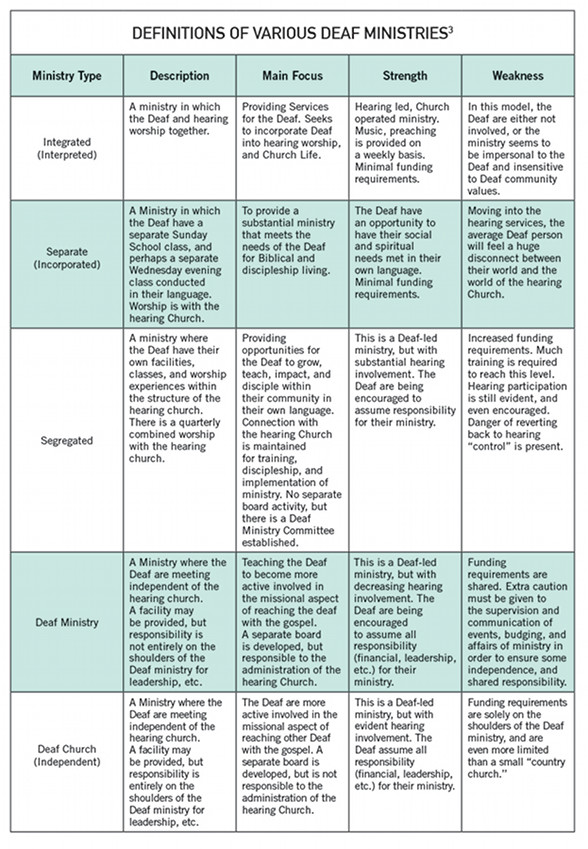Reaching the Deaf
An Entirely Different Experience

Rick Article B from GSLT Communications on Vimeo.
The videophone lit up in my office years ago and displayed an unknown number. At the other end of the conversation was a video relay interpreter helping to facilitate a conversation with the Senior Pastor of a large metropolitan church that was interested in beginning a ministry with the Deaf. “We want to begin a ministry with the Deaf community, here in our town. I am calling to investigate the feasibility of such a ministry. Would you be interested in being a part of this conversation?” After dispensing with the pleasantries, I asked the pastor a question, “Why do you want to begin this ministry?” His response was, “Well, to be honest, I really don’t know. A member in our church has a Deaf relative and asked me to consider a proposal to begin a ministry with the Deaf. I am now beginning the investigation—getting all of the facts, putting my feet in the water before I jump in the pool!” I asked if he had any connections with the Deaf community, friends, family, or otherwise, and he responded, “No, not really. But if this is what God wants us to embark upon, I’m willing to do whatever it takes1 to do his will.” 2
You may have thought about a deaf ministry in a similar manner. Someone may have come to you and asked, “Pastor, I have a burden for the Deaf and Hard of Hearing. Can we consider a ministry for them, here?” What steps, concerns should you have and what direction should you go with this? This may be at the forefront of each pastor’s mind as they attempt to make proper and prudent decisions regarding the practicality of beginning any type of ministry. And it should be. But there is a different element involved in working with the Deaf community that is not present in the establishment of any other ministry—determining to work with the Deaf and Hard of Hearing is not simply a language issue. It is more of a relational issue.
In my discussions, I usually share that there are five different approaches to beginning a ministry with the Deaf. There are obvious pros and cons inherent with each approach as represented by the chart below:

The chart teaches and promotes a progression of ministry from an integrated approach to Deaf church. As you move down the scale there is a progression that moves from a higher percentage of hearing involvement to a higher percentage of Deaf involvement the more the ministry is Deaf-centered. The reason being is that in the initial phase of every ministry, a deaf person is introduced to the church, its purpose, process, and its potential. The purpose of the ministry is to introduce the deaf person not only to the church, but also to Jesus Christ. As the deaf person moves forward in their spiritual journey there’s a greater assimilation into the church and empowerment for ministry. This assimilation fosters an increasing awareness of maturity, and confidence in the call of God upon their lives in ministry. The most important statistic for consideration is not the number of Deaf people in ministry, or the funding that is required for sustaining the ministry. The most important consideration is the number of deaf people involved in active, relational ministry.4 This implies an assumption of responsibility by the Deaf for ministry and an increased willingness to be open for training and implementation within the church.
 An interpreted ministry must not be viewed as the only option, nor is having a fully organized Deaf church to be the only goal. One must be aware of the importance of ministry within the specifics of the Deaf culture—a culture that is complete with its own language, behavior, and perspective of music and the arts. One must consider the resources available for the church, as well as within the community. The Deaf culture is defined and influenced by the people that make up the culture. One must also consider the personality of the Deaf community to whom they minister.
An interpreted ministry must not be viewed as the only option, nor is having a fully organized Deaf church to be the only goal. One must be aware of the importance of ministry within the specifics of the Deaf culture—a culture that is complete with its own language, behavior, and perspective of music and the arts. One must consider the resources available for the church, as well as within the community. The Deaf culture is defined and influenced by the people that make up the culture. One must also consider the personality of the Deaf community to whom they minister.
The nuances of the Deaf culture are different. Young Deaf people grow up, graduate from high school, go to college and rarely return home again. Young Deaf couples have hearing children, and when the kids are grown and gone, so are their ties to the hearing world.. What makes the difference between success and failure? Simply, it is summed up in one concept; relational ministry. The stronger your integrity in the relationships you (or your leaders) have in the Deaf community, the stronger your trust will be in and from the community. This will move on to strengthening your impact on the lives of the Deaf, displaying the strength of your leadership, and deepening life experiences within the church.
The Senior Pastor that called me that day? He began his ministry with the Deaf on a progressive experience, with a simple introduction to the Deaf community in the life of this young deaf man with whom he became a close friend. He learned his language, and he became a part of his world. As the young man grew up, he also grew in his faith—in his ability to live and share his faith with others. The ministry progressed, one person at a time, from an interpreted ministry to a Deaf ministry (not a Deaf church) as he began to understand the specific needs of the Deaf community that were not being met through his preaching (because of language differences, cultural differences, etc.). The Senior Pastor adapts his schedule to work with both the Deaf and hearing. Occasionally, he preaches for the Deaf in their services.
The Deaf community knows he is an unusual pastor. They know he cares for them; he makes himself available for them, and supports them. They know they have someone that serves them not as a service provider, but someone that works and lives alongside them, understands their needs and their struggles. In short, he has become a servant of his community and, as Paul admonishes, “… become [Deaf]…to all the [Deaf] in order that [he] might win some.”5 His greatest joy is seeing the Deaf serving and training other Deaf for the work of ministry.
Here are some of the questions one must ask in beginning a ministry with the Deaf:
- Why are you beginning this ministry? Is this a burden of the Lord upon your heart, or is this simply to fill a community need?
-
What type of ministry are you envisioning?
What type is best for our community? Why? - What will be your role as Senior Pastor in this ministry?
- What is the response of the people in your church/Board for this ministry?
- What kind of financial commitment will you make for this ministry?
-
Who will be in direct supervision of the ministry?
How will you delegate responsibility for the ministry? - What resources do you have within the church for this ministry?
- What connections do you have with the Deaf community? Are you aware of the various resources within the Deaf community for this ministry? Are there other ministries/churches in the area that have a Deaf ministry? What will be their response to your start-up? How will you handle negativity/lack of support for your start-up?
- What road map will you devise that will allow the Deaf to assume leadership of the ministry? How will you develop training and discipleship for this purpose?
- How will you sustain the ministry in purpose and in existence?
- What will the Deaf ministry look like in 5 years? 10 Years?
As Scripture teaches, we must be willing to count the cost before we begin any ministry endeavor.6 Scripture also promises that whatever God has called us to do, he is faithful in empowering us to complete.7
Come … let’s proceed into the Deaf world and make disciples of them, teaching them to observe all things he has commanded us, and let us remember … in the low moments of our lives, he is always there with us—through it all!8









comments